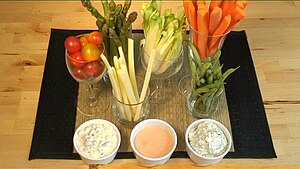Low Carb v. Slow Carb
| Raw vegetables and dips (Photo credit: Wikipedia) |
Slow-carb is just another way of saying that you need to ingest carbs that are slow burning, such as vegetables, and even some fruit. Fast burning carbs would include processed breads and pastas, for instance. These are the carbs that give a quick sugar boost, then drop just as quickly.
Not all carbs, even slow burning carbs, are created equal. Some low or slow carb diets recommend staying away from some vegetables they consider high in sugar, such as corn or peas, especially during the first phases. The same is true for dried beans and other protein rich foods that also are considered higher in carbs.
When comparing lists of acceptable foods on any low carb diet, you'll see differences. You'll also see differences in what levels of carbs are going to result in weight loss, and where those carbs should come from. In some diets, even slow burning carbs like dried beans are forbidden in the first phases. In other diets, all carbs, as long as they are slow burning carbs, are just fine.
This is not simple, but it is all a matter of opinion, personal preference, and what works for you. If you've been on a diet that includes such slow burning carbs as brown rice, black beans, and quinoa, and haven't seen any results, this diet may not be for you. Individuals process carbs differently. Simply following a diet according to a low-glycemic index (the amount of carbs in a food) may not be what you need to lose weight, or it may be, but it's a good way to start understanding how your body processes carbohydrates.
The Protein Process
Years ago, people were going on all sorts of vegetable and fruit only diets. Then there were the whole grain diets. None of those diets are part of our common vernacular today, but the diets that are high in protein and low in fast-burning carbs are. Protein is essential for building muscle, which burns fat, and keeps us strong. Protein is a building block, just like other nutrients we know to be essential.
No matter which diet you follow today, if it includes a balanced approach to good sources of protein and carbohydrates, it is most likely a respectable weight-loss program. Human beings cannot live on protein alone, nor does any proper diet developed by a health professional suggest otherwise. There was, actually, a myth around high protein, low carb diets for years. Nowhere in the mainstream market of dieting did a protein-only method for weight-loss exist. Even one of the most popular diets for decades that suggested adding more servings of proteins at every meal, actually formed the basis of their diet on ingesting more vegetables than protein. People could get seriously ill, even fatally ill, by eating only protein, and this approach was never approved or suggested by any mainstream diet.
| (Photo credit: Wikipedia) |
The Fat Fact
This seems to be where the division lies in many low-carb diets. Some diet plans say simply that you can't get “fat from fat.” Other diet plans are so concerned with fat intake that they allow more carbohydrates if it means avoiding fat, as is the case with most 'lite' foods. If you check the labels, you'll often find that “low fat,” “reduced fat,” and “light or lite” means added sugars to tweak the flavor.
The reason is simple; fat is flavor. That's why some mainstream low-carb diets recommend eating regular, full fat foods, such as regular mayonnaise, sour cream, and even whole milk or heavy cream. While other low-carb diets have fats restricted by eating only fat-reduced dairy, dressings, etc.
The debate over fat is not easily settled. Fat is essential to your body's health, and particularly to your brain. Fat gives food flavor. Fat also makes you feel full. Without fat in your diet, your body will suffer. However, it's also important to remember that it's the type of fat you eat that matters. Fat that naturally occurs in nuts and avocados, for instance, are considered by most diets as essential elements. Added fats for cooking and serving foods, such as olive oil, are often included in healthy fats, but not in all stages of all diets. It all depends on which diet you're following. Clear as mud, right?
So what is the truth? Should you eat whole grains and black beans on a low carb diet or stick to celery and broccoli? How much protein is enough protein? Should you eat eggs fried in olive oil or poached in water? Are fats good or bad for you?
The fact is, the answer is different for different people. Some people respond very well to a high protein diet with added fat, while others simply don't. Some people lose weight eating a diet that's rich in whole grains, while other people gain weight. The best thing anyone can do is get all the information, then use your own common sense to decide what works for you. Keep a journal as you add and subtract foods from your diet, then do what works best for you. I know that may not be the clear-cut answer you were looking for, but the truth is, every body simply functions slightly differently, and there really isn't one "magic pill" for everyone when it comes to health & nutrition, or even weight-loss.



No comments:
Post a Comment
We welcome comments and suggestions!